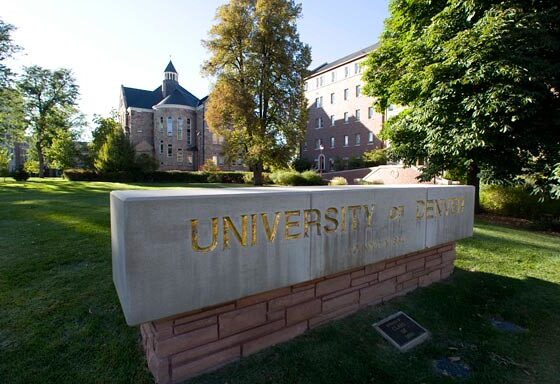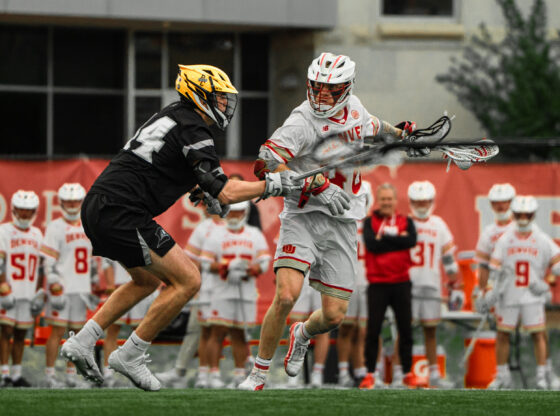DU has recently informed Chi Phi fraternity members that as of fall quarter they will be residing at the House of York apartments due to Chi Phi’s lease cancellation.
Chi Phi fraternity cancelled its housing leaseB in December 2006 with the intention of renegotiating for a “reasonable housing deal,” according to Andy DiPalma, president of the fraternity. Lease cancellation is a requirement if the fraternity wants to renegotiate with the university.
However, the university was “unwilling to offer us anything better than the terms which we cancelled the lease under,” said Zach Moar, vice president of Chi Phi.
As a result, the members will be moving into apartments, and the members of Phi Kappa Sigma may possibly reside in the Chi Phi house, although that has not been confirmed.
According to DiPalma, the lease that Chi Phi was unwilling to agree to was slightly under the maximum occupancy of 32 people in 25 bedrooms. Some of these bedrooms were designed for single-occupancy.
In addition, the lease that DU offered specified that there would be no cost reduction for the 14 people who would need to double-up in single-occupancy rooms, said DiPalma.
Recently, the university has informed Chi Phi members about the alternative housing option at the House of York.
“The Division of Student Life is working very closely with the fraternity to make sure its housing options are met,” said Megan Pendley, assistant director of Campus Activities.
“We have had a number of meetings with the chapter leadership, and they have chosen to live in the House of York apartments. They are currently working with Housing and Residential Education to make sure their brothers are housed together there,” said Pendley.
Director of Greek Life Carl Johnson, mirrored Pendley in stating that the university has worked hard to maintain the best possible interests of all students involved.
“We have solved the concern, and we will continue to keep the best interests of all our students, including the Chi Phis,” said Johnson.
Chi Phi executives have also stated that the university has ensured their best interests.
“DU did not single-handedly create this situation. As soon as we informed them that we were unable to continue with a housing lease that was unachievable, the university looked into alternative situations which would be advantageous,” said Moar.
The Chi Phi members are excited about the future opportunities for their fraternity.
“Due to not having to pay for such a large and expensive house, we will have greater resources to put toward all-campus events such as social events, philanthropies and possibly even concerts for the entire DU community,” said DiPalma.
Even with these potential opportunities ahead, the members feel it is “unfortunate that we are leaving our current house,” said Moar.
Phi Kappa Sigma, which is currently located across the street from Chi Phi, thinks the situation with Chi Phi’s house is regrettable, too.
“We all love the Chi Phi guys,” said Corey Hayes, president of Phi Kappa Sigma. “All the houses are working together a lot better, and the relationship between every fraternity house, the bond, has become much stronger, so we don’t want to see the Chi Phi’s move out of the house.”
The connection between the two fraternities may become more pronounced in the near future.
With the Chi Phi fraternity soon to be vacated, the possibility has arisen that the house will become a future residence for the members of Phi Kappa Sigma, whose property has been sold.
However, there has been no confirmation of this occurring.
“The university will not divulge information to us about the Phi Kappa Sigma deal and has denied all rumored specifics about the negotiations with Phi Kappa Sigma,” said DiPalma.
Hayes could not confirm the move either.
“Phi Kappa Sigma has a 49-year lease left on the building, with a 99-year renewable clause. We will be very sad if we have to leave our house, but we have not worked anything out with the school at this point,” said Hayes.
Phi Kappa Sigma has had its house for almost 40 years, according to Hayes. He said the university sold the land all around the house.
“They [the university] are toughening sanctions on fraternity houses to the point where it almost feels to Greek Life that they are trying to squeeze us out of the houses,” said Hayes.
Chi Phi echoed this feeling. “Demolishing a fraternity house and selling off the property to a private developer creates a housing crunch for Greek Life. [This] gives DU the ability to make the fraternities compete with each other over the limited housing to maximize DU’s profits,” said DiPalma.
Moar supported his sentiments.
“It sets a bad precedent for the university to view Greek Life houses as properties for profit,” said Moar.












